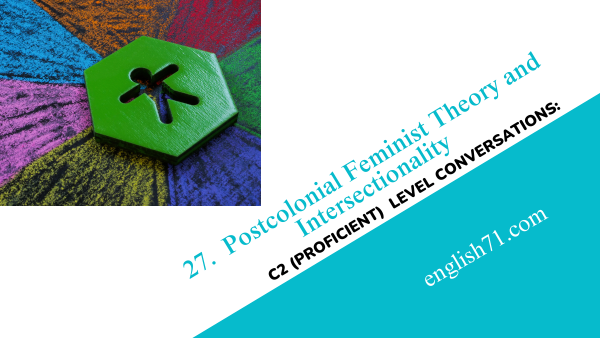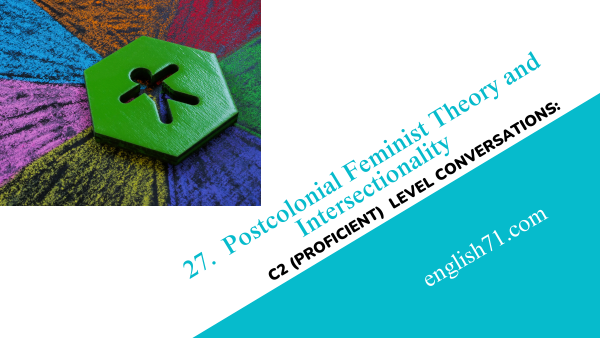C2 (Proficient) level Conversations: (27) Postcolonial Feminist Theory and Intersectionality

Amy: Hey Chris! Have you heard about postcolonial feminist theory and intersectionality?
Chris: Yeah, I’ve come across those terms before. It’s about understanding how gender intersects with other aspects like race, class, and nationality, right?
Amy: Exactly! Postcolonial feminist theory examines the impact of colonization on women and how it intersects with gender issues.
Chris: And intersectionality looks at how different forms of discrimination overlap and compound each other, affecting individuals differently depending on their identities.
Amy: Right. It’s essential to recognize that feminism isn’t one-size-fits-all and that women experience oppression differently based on various factors.
Chris: Definitely. Intersectionality reminds us to consider the complexities of identity and power dynamics when addressing social issues.
Amy: Exactly. By understanding these theories, we can advocate for more inclusive and equitable solutions to social problems.
Chris: Absolutely. It’s about acknowledging the diverse experiences and perspectives of women and addressing the interconnected systems of oppression they face.
Amy: Well said, Chris! These theories provide valuable frameworks for promoting social justice and equality.
Chris: Couldn’t agree more, Amy. Let’s continue learning and advocating for a more inclusive and equitable society.
Amy: Absolutely, Chris. Together, we can make a difference.

Summary:
In the conversation between Amy and Chris about postcolonial feminist theory and intersectionality, they explored how feminist theories have evolved to address the complexities of gender, race, and colonialism. They delved into the ways in which postcolonial feminism critiques Western-centric feminism and emphasizes the importance of considering the experiences of women in the Global South. Intersectionality emerged as a key concept, highlighting the interconnectedness of various forms of oppression and privilege. They discussed how intersectionality enriches feminist discourse by acknowledging the diverse identities and experiences of individuals. Amy and Chris also reflected on the ongoing challenges faced by postcolonial feminist movements in their efforts to promote gender equity and social justice globally.

